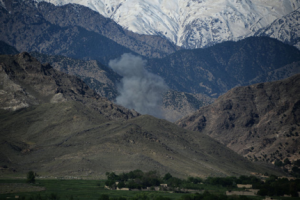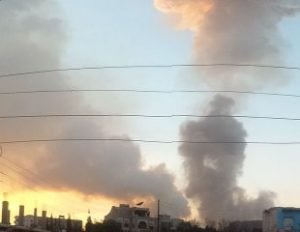US Drone Program Whistleblower Explains Why She Spoke Out
"The intelligence community seems to have lost its way" Lisa Ling.
Lisa Ling, US Air Force whistleblower who exposed secrets of the American drone program in the documentary National Bird, has been discussing why she decided to blow the whistle, what interests are behind the use of drones, and the outlook given the lack of accountability by the US government.
Edu Montesanti: Lisa Ling, thank you so very much for granting this so important interview. When, how and why did you blow the whistle against US drone program ?
Lisa Ling: I blew the whistle on the drone program by going on the record in Sonia Kennebeck’s documentary film National Bird. It wasn’t something I took lightly after spending so many years in the military. I am not against my fellow service members in the U.S., or abroad; I am against policies that can claim lives and limbs of innocent non-combatants even in places we are not at war.
I believe that if it is something where we are unwilling to send troops, and have the public be fully aware of what is being done in our name, than there is something definitely wrong about it that must be addressed. I also believe that governance over such a massive system is important and that discussion and public awareness is the only way that will happen.
I knew I was going to speak out and that I am against weaponized drones, but it wasn’t until Sonia Kennebeck approached me during a veterans conference that I had any idea of how it would be possible for me to speak out. Since the film, I have had numerous opportunities to engage with people and learn how little the public knows about the drone program.
Sonia Kennebeck discovered how little was known or talked about with regard to the military drone program, and that service members who worked in the drone program had actually taken their own lives. She did an enormous amount of preliminary research before making the film; much of her research she showed me after several meetings where we discussed my participation.
Finally after much thought, I said I would do it, and be on the record. It was a difficult decision, but I still believe it was the right one. I have nothing but respect and trust for Sonia and her team for giving me the opportunity to share my story, and most importantly for giving the Afghan victims an opportunity to share their story with the world. That was one thing that really motivated me to participate in the film.
Edu Montesanti: When the Obama administration discussed drone strikes publicly, it offered assurances that such operations are a more precise alternative to boots on the ground and are authorized only when an “imminent” threat is present and there is “near certainty”; that the intended target will be eliminated. How do you see such a “policy”, that of substituting boots on the grounds by drones – in the case of the Obama administration, using it much more than the Bush administration? And how precise are drones?
Lisa Ling: I do not think drones are a good alternative to human intelligence. I do not see how technology, no matter how “good” it is, is an effective replacement for human beings in the current situation. I do not see how a two dimensional image is good enough to replace the situational awareness of trained soldiers on the ground. All lives of innocent human beings require the same reverence; in my view no life of innocent non-combatants is more important than another. Here in the United States, we are innocent until proven guilty beyond a reasonable doubt and even then innocent people are imprisoned. That is a much higher standard; one I believe should be met, especially in countries where we are not at war. The people on the ground do not have an ID card, or a driver’s license. Many people in Afghanistan do not know the exact date they were born. It is not always clear who is and who is not an enemy combatant, under these conditions nothing can really be “precise”.
Edu Montesanti: As President Trump is giving the CIA more freedom to attack with drones, things are going to get worse… no?
Lisa Ling: What is needed is human intelligence, and the CIA, I believe, is the organization responsible for gathering it. The intelligence community seems to have lost its way. Instead of studying different cultures or appreciating social and traditional nuances it is depending on technology and quantity of data collected – not quality actionable information.
The data gathering and collecting capacity means nothing if there is too much to actually analyze effectively by those who understand the cultural or traditional implications found in it.
Oversight and governance globally and locally is necessary to keep this immense power in check. This will never happen in the hands of any clandestine organization. It could take years for the public to find out about faults costing thousands of innocent human lives, and the ability to correct any disparity could take decades. Keeping an eye on the proportionality legally required would be exceedingly difficult if it were even possible at all.
The world is now our battlefield; this already violates the Nuremburg principles and other international laws. I do not see how effective governance or oversight is practical or achievable under these conditions.
Edu Montesanti: How do you see the official version in the US government involving drone “efficient” attacks as they actually kill much more civilians?
Lisa Ling: Technology will never replace real situational awareness and without that, how can we know who lives and who dies with any certainty at all. Efficient is an interesting word to use. Wouldn’t “efficient” mean a quick end to these wars? I am not sure how to use the word efficient in the context of wars that have lasted as long as these wars have with no end in sight.
Peace is efficient, and preferable. I assume efficient could mean a clear winner and looser in the context of war, and yet as it stands this doesn’t seem to be where we are. War is not efficient by it’s very nature. Killing other human beings is not a matter of efficiency and relegating human lives to such sanitized terms seems cruel to me.
I do not think armed drones are efficient or proportional when used to seek out individual human beings. I do not think armed drones are efficient or even ethical in this context. Sending Drones is also enabling war to be invisible, there is no weighing it against sending troops so there is less of a connection to it. There is less discussion or assertion because it isn’t publicly announced like it often is when we deploy troops.
It has made a kind of new normal of constant war. There is a dangerous separation that is allowing the wars to continue with very little pushback, no one says send our troops home when fewer and fewer troops are being deployed.
It is easier to send drones without loosing political capital, it makes endless war too easy and we are living with the evidence of this, and more importantly the innocent civilians living under drones are living with it.
Those living under armed drones are living in constant terror. I don’t think we can fight a war on terror with more terror.
Professos Doctor Azadeh Shahshahani of American Civil Liberties Union, observes that: a) In the domestic (US) context, they be used for artistic or investigative purposes. For example, they can be used to investigate agribusinesses to see if they are engaging in animal abuse or not. In that sense, they can play an important and legitimate role. However, their use needs to be regulated to ensure that they are used for surveillance by law enforcement agencies. b) Per international humanitarian law, drones can only be used with bombs in an active armed conflict and even then with certain restrictions including military necessity, humanity, distinction, and proportionality. Only combatants or civilians who are directly participating in hostilities may be targeted. Targeting of other civilians is prohibited and may constitute a war crime. How much the US government is respecting these principles, Lisa, using drones both as surveillance and bombs?
In my view, it is not possible in the absence of ground troops, to know the answer to this question with any certainty. Much of their use is in secret, which is another reason it is hard to be certain.
It is difficult to tell who is and isn’t an enemy combatant. It is not like there is a uniformed opposing military force and the battle lines are clear. This is global and borders don’t seem to matter.
This is why I believe global governance specific to armed and unarmed drones is necessary. I believe drone specific agreements between nation states must be made. I also believe there should not be weapons on drones; I believe that the missiles and bombs should be removed.
Proportionality does not seem attainable when weaponized drones have relegated war to a kind of hunter vs. prey. The truth is that living under drones when you don’t know if and when something is going to come down from the sky and kill you or someone you love is terror by it’s very definition.
Drones have killed people of all ages and professions. No one has respite; they can’t say I am holding an infant so it will not come for me or I am a doctor, it will not attack me. I couldn’t imagine living like that. That is one reason I think the weapons should be removed from drones.
Edu Montesanti: Given all this, why do you think US government and the CIA insist on using drones? What are the real interests behind it?
Lisa Ling: There is a lot of money to be made; there is political expedience when a drone is sent instead of someone’s son or daughter. There are so many possible answers to this question; many are well above my pay grade.
What I know is that these wars are still going on, and that blowback is a thing that happens. Mothers and fathers, sisters and brothers are still dying both at home and overseas. There is still no end in sight to the devastation in countries like Afghanistan, Syria, Yemen, Pakistan and all the other places where armed drones fly.
I know that as a nation when we set our collective agency to a goal, we generally achieve it. The global arms trade is a powerful thing. President Dwight D. Eisenhower famously warned U.S. citizens about the military–industrial; in his farewell address. Perhaps we are now in the place he warned us about.
That being said, it is time to rearrange our collective priorities to a place where humanity and the sanctity of all human life are at the top of the list. We all must start doing all that we can to ensure that is the case.
Edu Montesanti: How are drones going to affect humanity in the near future, being used this way both in wars and surveillance by the US?
Lisa Ling: We are now at a pivotal point in the use of armed drones. Soon, if not already, drones will be stealth and capable of deployment to developed countries such as our own. Artificial intelligence will be implemented and human intervention will become unnecessary. When this happens, how will the Global West react? Will we choose global governance? Will we change the precedence we are setting by what we do? It is illogical to believe that the use of any military technology will not be used against us at some point in time.
Maybe speaking this truth will get others to engage in the realities of what the future has in store if we leave things as they are. Maybe by acknowledging that weapons have a way of proliferating out of control, things will change. It is not that I believe that lives of people in the Global West are any more valuable than the lives of people from any other place on earth; it is just that if something is happening “over there” we tend to think as if it has nothing to do with us.
How we treat humanity has everything to do with all of us and I believe that is the most important thing we ought to consider when we talk about drones and other military technology. It is true that what goes around comes around, it is just a matter of when.
***
Edu Montesanti is an independent analyst, researcher and journalist whose work has been published by Truth Out, Pravda, Global Research, Brazilian magazine Caros Amigos and numerous other publications across the globe.
This article was originally published by teleSUR.




